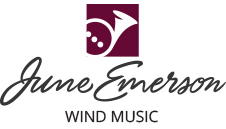| Composer: | Haydn, Joseph (1732-1809) |
| Instrumentation: | 2ob. 2cl. 2bn. 2hn. (cbn) |
| Publisher Ref: | E400c |
| Arranger: | Druschetzky, Georg |
| Editor: | Hellyer, Roger |
| Skill Level: | C/D |
| Publisher: | Emerson Edition Ltd |
| ISMN: | M570407507 |
| ISBN: | none specified |
We endeavour to dispatch all orders which are in stock on the day the order has been placed. If you need delivery by a certain time please state this clearly on your order and we will do our best to oblige.
For Royal Mail Special Delivery, Airmail (Signed For) and Courier shipments, a signature may be required upon delivery to your address. You are responsible for your order once the package arrives at the supplied delivery address. We cannot be held responsible if the package(s) goes missing once delivered. If any goods are received faulty or damaged on receipt, you must notify us within 7 days of receiving them (via email or telephone) quoting your order reference. We cannot be held responsible for goods that do not arrive with the customer due to errors made by the customer when entering their address details. Please ensure that you check all your details before confirming your order. For more information on deliveries, please click here.
We offer a truly comprehensive selection of wind music online, with well over 65,000 titles listed, most of which are in stock and ready for immediate despatch.
We also stock a large range of theory and aural resources and specialist books.
We are absolutely committed to providing a first class service to musicians worldwide.
If you’re looking for a piece of music that isn’t listed on our website, we will do whatever we can to find it for you, no matter how long it takes.
VAT No: 172 1180 92 GB
EORI No: GB172118092000
We are a friendly, helpful team of people with lots of specialist knowledge.
For advice and information, contact us on +44(0)1439 788324 Monday to Friday (excluding Bank Holidays) between 9am and 5pm (GMT).
9am to 5pm (GMT)
Monday to Friday
(excluding UK Bank Holidays)
VAT No: 172 1180 92 GB
EORI No: GB172118092000
June Emerson Wind Music
Windmill Farm
Ampleforth
York
YO62 4HF
England
Email: sales@juneemersonwindmusic.com
Tel: +44 (0)1439 788324
Fax: +44 (0)1439 788715
Copyright 2024 © June Emerson Wind Music. All rights reserved.
Privacy Policy / Terms & Conditions
